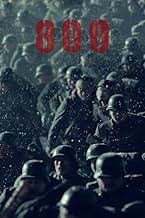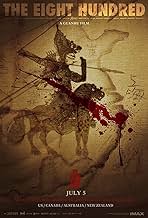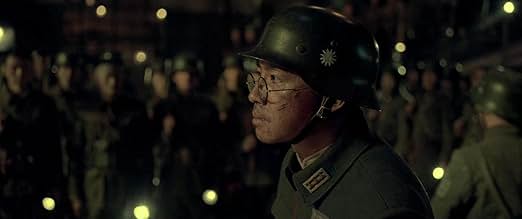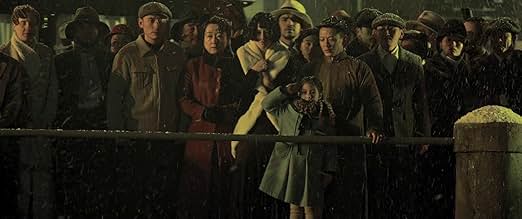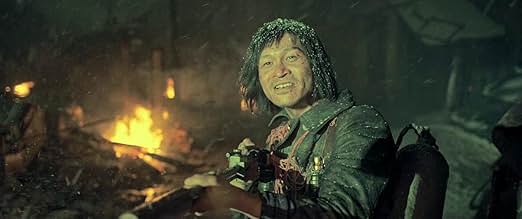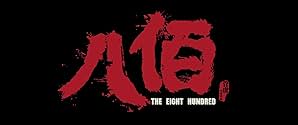En 1937, 800 soldados chinos luchan en desde un almacén sitiado en un campo de batalla en pleno Shanghái, completamente rodeados por el ejército japonés.En 1937, 800 soldados chinos luchan en desde un almacén sitiado en un campo de batalla en pleno Shanghái, completamente rodeados por el ejército japonés.En 1937, 800 soldados chinos luchan en desde un almacén sitiado en un campo de batalla en pleno Shanghái, completamente rodeados por el ejército japonés.
- Premios
- 27 premios ganados y 40 nominaciones en total
Vision Wei
- Zhu Shengzhong
- (as Chen Wei)
Lu Cao
- Jiang Jing
- (as Noah Lu)
Opiniones destacadas
The visuals of this film are artistically cinematic and very gritty. It's a beautiful picture with tons of on screen action. The director adds so many simultaneous events in each frame that it kept my eyes busy scanning the periphery to take it all in. This film has high budget written all over it. From the sets, customs, cgi, special effects and large cast it's very impressive. You can also see a lot of American and European cinematic influences in the film. Especially during the flag raising which was reminiscing of Iwo Jima flag raising. The gory firefights and sniper kills gets your heart running.
Where the film falls short are the many overdrawn patriotic speeches and at first they are cool but become long on the tooth in this 3+ hour film which actually felt like four hours or more. Many scenes don't add much to the story and I think distracts from the film. I think this film could use an editor to shorten the film a bit and clear up the story.
Where the film falls short are the many overdrawn patriotic speeches and at first they are cool but become long on the tooth in this 3+ hour film which actually felt like four hours or more. Many scenes don't add much to the story and I think distracts from the film. I think this film could use an editor to shorten the film a bit and clear up the story.
In 1937, WW2 has started for China, with the Japanese invasion. On the southern front, the Chinese army has abandoned a ruined Shanghai, except for one warehouse. This is defiantly defended by one regiment of about 800 troops, where seasoned professionals are reinforced by raw recruits of varying eagerness. The warehouse has 2 attributes: used as a bank vault, it has extra-thick walls; and it is across a small river from the English Concession. The foreign concessions are considered foreign territories by the Japanese, who try to avoid touching them. Thus we have the juxtaposition of a battlefield with a bustling, well-lit area, where crowds hang around the riverside street to watch the action, and the privileged (including foreign press photographers) watch from the balconies.
The movie alternates between the warehouse action, and the events in the concession. In and around the warehouse, the action includes close combat, snipers, and occasional speeches. It is refreshing to see a Chinese action movie without martial arts. While there is blood and bandages, it is not the gorefest some western directors seem to like. There some of the Chinese soldiers are featured, whereas on the Japanese side only one commander had any speaking role. The switching to the concession side gives the audience a break from the action, and keeps the narrative fresh.
This was based on actual historical events, and the movie included a final shot of the warehouse - with a backdrop of modern Shanghai skyscrapers. I read that the movie's opening was delayed, so that scenes of the national government could be cut. This government, or its successors, still govern the rebel island of Taiwan. But for the flag-raising scene, it was still the historically-accurate sun-in-sky national flag that went up.
The movie alternates between the warehouse action, and the events in the concession. In and around the warehouse, the action includes close combat, snipers, and occasional speeches. It is refreshing to see a Chinese action movie without martial arts. While there is blood and bandages, it is not the gorefest some western directors seem to like. There some of the Chinese soldiers are featured, whereas on the Japanese side only one commander had any speaking role. The switching to the concession side gives the audience a break from the action, and keeps the narrative fresh.
This was based on actual historical events, and the movie included a final shot of the warehouse - with a backdrop of modern Shanghai skyscrapers. I read that the movie's opening was delayed, so that scenes of the national government could be cut. This government, or its successors, still govern the rebel island of Taiwan. But for the flag-raising scene, it was still the historically-accurate sun-in-sky national flag that went up.
After enjoying the trailer, and being a fan of Asian cinema, I went to the movies to watch The Eight Hundred.
As the movie is based on a true story and true events, it was very interesting to see a different kind of war film that's not Hollywood-ised and the great high quality production certainly was impressive.
The movie is gripping, intense with solid tension building throughout the movie, lots of action guns and bombs with great performances that I believe the actors deserve great credit for.
The writing and direction by Guan Hu was very impressive with nice stylised cinematography.
My own dilemmas with the movie was the pacing, story beats and focus on the central story. The movie felt too split everywhere into different perspectives and doesn't focus on a singular character or group to follow the story properly.
There was no clear goal or focus for us as the audience to keep an emotional core building. The essence of Chinese patriotism is the front runner story but I felt it took away from my attachment to following a core protagonist/s with their story instead of the theme or essence of patriotism.
There's lots of invasion attempts and warfare action with some heartfelt emotional scenes, but not a clear storyline direction that makes it understandable to follow.
Make sure to give this movie a go, it's definitely an experience!
As the movie is based on a true story and true events, it was very interesting to see a different kind of war film that's not Hollywood-ised and the great high quality production certainly was impressive.
The movie is gripping, intense with solid tension building throughout the movie, lots of action guns and bombs with great performances that I believe the actors deserve great credit for.
The writing and direction by Guan Hu was very impressive with nice stylised cinematography.
My own dilemmas with the movie was the pacing, story beats and focus on the central story. The movie felt too split everywhere into different perspectives and doesn't focus on a singular character or group to follow the story properly.
There was no clear goal or focus for us as the audience to keep an emotional core building. The essence of Chinese patriotism is the front runner story but I felt it took away from my attachment to following a core protagonist/s with their story instead of the theme or essence of patriotism.
There's lots of invasion attempts and warfare action with some heartfelt emotional scenes, but not a clear storyline direction that makes it understandable to follow.
Make sure to give this movie a go, it's definitely an experience!
It's 1937. Japanese forces have attacked the city of Shanghai. The foreign concessions become an island of civilization among the destruction of the city. Around 800 Chinese soldiers have fortified a warehouse across a canal from the concession area. They are mostly soldiers armed with the latest weapons from Nazi Germany. They are joined by some stragglers and a squad from the countryside. They hold out against overwhelming Japanese forces for months in front of an audience of international press and their fellow Chinese citizens.
First, the movie spends too much time showing scared and incompetent soldiers. Some of it is useful but it really makes it frustrating to root for the Chinese soldiers. The long-haired guy is really annoying. It may work if he's the only one but the movie seems to relish showing the Chinese soldiers as weak scared little boys. The balance is off. The real force consists of mostly well-trained troupes but the camera spends more time with the others who get collected. The flag section is a good high point except throwing that many bodies onto the flag is ridiculous. It's more effective to concentrate on one guy picking up the fallen flag and putting it back up. Finally, this uses too much slow motion especially in the last act. It could have more effective to let the brutal action overwhelm the senses. As a true war story, this is primed for a great telling but this is only partially good. Westerners may not like the portrayal of Nazis and I'm surprised that Communist China is willing to make Nationalist soldiers into heroes. Again, the Chinese soldier fighting with Nazi gear is going to be weird for a western audience. As a Chinese war movie, this is better than most. It looks great and it's compelling to watch.
First, the movie spends too much time showing scared and incompetent soldiers. Some of it is useful but it really makes it frustrating to root for the Chinese soldiers. The long-haired guy is really annoying. It may work if he's the only one but the movie seems to relish showing the Chinese soldiers as weak scared little boys. The balance is off. The real force consists of mostly well-trained troupes but the camera spends more time with the others who get collected. The flag section is a good high point except throwing that many bodies onto the flag is ridiculous. It's more effective to concentrate on one guy picking up the fallen flag and putting it back up. Finally, this uses too much slow motion especially in the last act. It could have more effective to let the brutal action overwhelm the senses. As a true war story, this is primed for a great telling but this is only partially good. Westerners may not like the portrayal of Nazis and I'm surprised that Communist China is willing to make Nationalist soldiers into heroes. Again, the Chinese soldier fighting with Nazi gear is going to be weird for a western audience. As a Chinese war movie, this is better than most. It looks great and it's compelling to watch.
This movie is internationally known as "The Eight Hundred". It is based on true events during the Japanese invasion of Shanghai, whereby the focus is put on the famous "Defense of the Sihang Warehouse".
The "Sihang Warehouse" is located directly next to the foreign concession of Shanghai. This means that all attacks by the Japanse army on the soldiers in the warehouse, are in direct view of all people watching from the concession. As such, many reports are available of the historic events surrounding this battle.
Since the movie often switches back and forth between different events, it is important to know how all events fit in the overall battle. It is therefore that - before watching this movie - I highly recommend you first read the Wikipedia article titled "Defense of the Shihang Warehouse". In my opinion, reading this Wikipedia article will not spoil the movie, but instead provide the necessary background for watching this movie. Amongst others, it explains why the chinese soldiers were dressed the same as german WW2 soldiers.
Due to the movie not having a main character, you as a viewer will have an additional challenge of understanding what's going on. During some events I had the idea someone was put center stage, all but to find out that he is not seen for the next 15 minutes or so... I think it would have been very beneficial if the movie would have for instance a voice-over - e.g. Someone who was there - whom explained what was going on.
One big plus of this movie are the extremely detailed scenes. It is just a 'feast for your eyes'. If you for instance pause the movie, you often will be able to discover details (in the background) which you wouldn't have seen otherwise. Overall, the result is a very convincing portrayal of Shanghai during WW2.
In coming to a conclusion, I think we have here a movie that misses some necessary ingredients to make the viewer fully understand what is going on. The director and writers were probably so accustomed to the historic events, that they assumed that everyone else would also be as aware as they are... Why on earth they did not chose for having a main character is beyond me. As such, this movie is often a challenge to watch. Especially the first 15 minutes, I personally was left in limbo of what exactly I was watching. Giving it a second try after reading up on Wikipedia helped me enormously.
Taking everything into account - including the fact that this movie learnt me quite some new and interesting things about WW2 - I decided to score this movie with 7.3/10. Resulting in an IMDb score of 7 stars, I think this movie could have easily gained 1 (or even 2) additional stars if more effort was put in guiding the viewer better in understanding the overall situation. I recommend to first read the Wikipedia article "Defense of the Sihang Warehouse"
The "Sihang Warehouse" is located directly next to the foreign concession of Shanghai. This means that all attacks by the Japanse army on the soldiers in the warehouse, are in direct view of all people watching from the concession. As such, many reports are available of the historic events surrounding this battle.
Since the movie often switches back and forth between different events, it is important to know how all events fit in the overall battle. It is therefore that - before watching this movie - I highly recommend you first read the Wikipedia article titled "Defense of the Shihang Warehouse". In my opinion, reading this Wikipedia article will not spoil the movie, but instead provide the necessary background for watching this movie. Amongst others, it explains why the chinese soldiers were dressed the same as german WW2 soldiers.
Due to the movie not having a main character, you as a viewer will have an additional challenge of understanding what's going on. During some events I had the idea someone was put center stage, all but to find out that he is not seen for the next 15 minutes or so... I think it would have been very beneficial if the movie would have for instance a voice-over - e.g. Someone who was there - whom explained what was going on.
One big plus of this movie are the extremely detailed scenes. It is just a 'feast for your eyes'. If you for instance pause the movie, you often will be able to discover details (in the background) which you wouldn't have seen otherwise. Overall, the result is a very convincing portrayal of Shanghai during WW2.
In coming to a conclusion, I think we have here a movie that misses some necessary ingredients to make the viewer fully understand what is going on. The director and writers were probably so accustomed to the historic events, that they assumed that everyone else would also be as aware as they are... Why on earth they did not chose for having a main character is beyond me. As such, this movie is often a challenge to watch. Especially the first 15 minutes, I personally was left in limbo of what exactly I was watching. Giving it a second try after reading up on Wikipedia helped me enormously.
Taking everything into account - including the fact that this movie learnt me quite some new and interesting things about WW2 - I decided to score this movie with 7.3/10. Resulting in an IMDb score of 7 stars, I think this movie could have easily gained 1 (or even 2) additional stars if more effort was put in guiding the viewer better in understanding the overall situation. I recommend to first read the Wikipedia article "Defense of the Sihang Warehouse"
¿Sabías que…?
- TriviaOne line of the film mentioned that the 800 from the 88th division have received German military equipment. That is only partial information as that division was trained by German military advisers who were helping China's government since 1927.
- ErroresWhen the journalists are setting up their cameras in front of the warehouse, several news outlets are named. One of them is AFP (Agence France-Presse), but the company was created seven years later in 1944.
- Versiones alternativasThe original cut set to be premiered in 2019's Shanghai International Film Festival is 160-minutes long. The re-censored version, which got finally released in 2020, is only 147-minute, with many replaced shots and multiple scenes blown-up and cropped.
Selecciones populares
Inicia sesión para calificar y agrega a la lista de videos para obtener recomendaciones personalizadas
Detalles
- Fecha de lanzamiento
- País de origen
- Sitios oficiales
- Idiomas
- También se conoce como
- The Eight Hundred
- Locaciones de filmación
- Shanghái, China(Defense of Sihang Warehouse)
- Productoras
- Ver más créditos de la compañía en IMDbPro
Taquilla
- Presupuesto
- USD 80,000,000 (estimado)
- Total en EE. UU. y Canadá
- USD 372,755
- Fin de semana de estreno en EE. UU. y Canadá
- USD 118,161
- 30 ago 2020
- Total a nivel mundial
- USD 461,421,559
- Tiempo de ejecución
- 2h 29min(149 min)
- Color
- Mezcla de sonido
- Relación de aspecto
- 2.35 : 1
Contribuir a esta página
Sugiere una edición o agrega el contenido que falta



